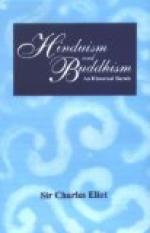[Footnote 1102: See Scott Moncrieff, Paganism and Christianity in Egypt, p. 199. Petrie, Personal Religion in Egypt, p. 62. But for a contrary view see Preuschen, Monchtum und Serapiskult, 1903.]
[Footnote 1103: Flinders Petrie, Man, 1908, p. 129.]
[Footnote 1104: J.R.A.S. 1898, p. 875.]
[Footnote 1105: Hultzsch, Hermas, xxxix. p. 307, and J.R.A.S. 1904, p. 399.]
[Footnote 1106: Nicolaus Damascenus, quoted by Strabo, xv. 73. See also Dion Caasius, ix. 58, who calls the Indian Zarmaros. Zarmanochegas perhaps contains the two words Sramana and Acarya.]
[Footnote 1107: See J.R.A.S. 1907, p. 968.]
[Footnote 1108: See Vincent Smith, Early History of India, edition III. p. 147. The original source of the anecdote is Hegesandros in Athenaeus, 14. 652.]
[Footnote 1109: See Flinders Petrie, Personal Religion in Egypt before Christianity, 1909.]
[Footnote 1110: As I have pointed out elsewhere there is little real analogy between the ideas of Logos and Sabda.]
[Footnote 1111: [Greek: Kuklou d’ exeptan bathupentheos argaleoio.] From the tablet found at Compagno. Cf. Proclus in Plat. Tim. V. 330, [Greek: hes kai hoi par’ Orphei to Dionuso kai te kore teloumenoi tuchein euchontai Kuklou t’ au lexai kai anapneusai kakotetos]. See J.E. Harrison, Proleg. to the study of Greek Religion, 1908, chap. XI. and appendix.]
[Footnote 1112: Burnet, Early Greek Philosophy, p. 94, says that it first occurs in the Busiris of Isocrates and does not believe that the account in Herodotus implies that Pythagoras visited Egypt.]
[Footnote 1113: Whatever may have been the true character and history of the enigmatic people of Mitanni it appears certain that they adored deities with Indian names about 1400 B.C. But they may have been Iranians, and it may be doubted if the Aryan Indians of this date believed in metempsychosis.]
[Footnote 1114: J.E. Harrison, l.c. pp. 459 and 564, seems to think that Orphism migrated from Crete to Thrace.]
[Footnote 1115: The question of the Disciples in John ix. 2. Who did sin, this man or his parents, that he was born blind? must if taken strictly imply some form of pre-existence. But it is a popular question, not a theological statement, and I doubt if severely logical deductions from it are warranted.]
[Footnote 1116: The pre-existence of the soul seems to be implied in the Book of Wisdom viii. 20. The remarkable expression in the Epistle of James iii. 6 [Greek: trochos tes geneseos] suggests a comparison with the Orphic expressions quoted above and Samsara, but it is difficult to believe it can mean more than “the course of nature.”]




